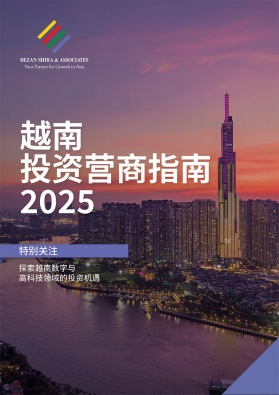Invoice Compliance in Vietnam: Key Changes under Decree 70
Effective June 1, 2025, Decree 70/2025/ND-CP (“Decree 70”) will amend and supplement a broad range of provisions under Decree 123/2020/ND-CP (“Decree 123”), which prescribes the issuance and maintenance of invoices and records. This article outlines key changes specified under the new decree, as well as compliance advisory for regulated firms.
Decree 70 introduces compliance requirements for foreign suppliers engaged in e-commerce in Vietnam, mandates specific timings for invoice issuance across various transactions, and allows these suppliers to use value-added tax (VAT) invoices.
The decree also provides guidance for export processing enterprises on invoice types based on VAT declaration methods and outlines the requirements for invoices from digital platform transport services. These changes aim to enhance regulatory compliance and streamline invoicing processes within the e-commerce sector.
Inclusion of foreign suppliers doing e-commerce business
Decree 70 introduces an additional subject to Clause 1e, Article 2 of Decree 123, which outlines the regulated entities for the issuance and management of invoices and records. Accordingly, foreign suppliers engaged in e-commerce or offering digital platforms and other services in Vietnam without a permanent establishment who choose to register for electronic invoices (e-invoices) must comply with the regulations set forth in Decree 123 as specified by Decree 70.
Time of invoice issuances
Decree 70 amends Article 9 of Decree 123 and sets deadlines for invoice issuance for certain cases.
|
Invoice Category |
Time of Issuance |
Notes |
|
Sale of goods (including transfer of public assets) |
At ownership transfer to the buyer, regardless of payment status. |
|
|
Export of goods |
The seller determines the issuance time, but it is not later than the next working day after the completion of customs clearance. |
|
|
Provision of services |
Upon completion of service provision, regardless of payment status. |
If payment is received in advance, issuance time is at the time of payment (excluding deposits). |
|
Large volume goods/services |
No later than the 7th day of the month following the month in which the service is provided; or No later than 7 days from the end of the agreed period. |
Includes specific services per regulation, such as aviation support and logistics. The agreed period, which is used as the basis for calculating the quantity of goods and services provided, is based on the agreement between the seller and the buyer. |
|
Sale of crude oil and derivatives |
When buyer and seller confirm official sale price, regardless of payment status. |
|
|
Sale of natural gas |
When the buyer and seller determine the gas delivery volume of the month, but no later than the last day of the deadline for declaration and tax payment for the month in which the tax liability arises. |
Special rules may apply if specified by government guarantees. |
|
Loan activity |
Typically at the interest collection period stated in the credit contract. |
|
|
Currency exchange agency |
At the time of currency exchange and completion of cash services. |
|
|
Passenger taxi services |
At the end of the trip, an electronic invoice is issued, and data is sent to tax authorities. |
|
|
Medical examination and treatment services |
Invoices can be issued at the end of the day based on treatment data. |
If the customer does not request an invoice, at the end of the day, it is required to summarize and issue an invoice for all services. |
|
Insurance business |
At the time of recognizing insurance revenue. |
|
|
Traditional lottery tickets |
Invoices issued before the next drawing, for unsold tickets returned. |
A separate invoice for each agent is issued. |
|
Casino and electronic gambling activities |
Latest one day after revenue determination for the previous day. |
Data on amounts collected must be sent to tax authorities simultaneously. |
Supplements on invoice usage
Allowing foreign suppliers doing e-commerce business to use VAT invoices
The decree stipulates that VAT invoices are used for organizations declaring VAT using the deduction method, specifically for e-commerce business activities, digital platform-based business activities, and other services provided by foreign suppliers without a permanent establishment in Vietnam.
Guidance for export processing enterprises on the use of VAT invoices
Decree 70 amends Clause 2b, Article 8 of Decree 123, and stipulates that export processing enterprises must issue:
- Sales invoices if using the direct VAT method (for non-export activities); and
- VAT invoices if using the deduction method.
Supplementing new regulations on types of e-commerce invoices
Decree 70 specifies that e-commerce invoices apply to organizations, enterprises, and individuals exporting goods and providing services abroad who can transfer invoice data to tax authorities electronically. If the exporter is unable to transfer commercial invoice data electronically, it may issue an electronic VAT invoice or an electronic sales invoice.
Additionally, the decree specifies two cases where e-invoices (VAT invoices, sales invoices) must be used with the tax authority’s code per transaction:
- The enterprise is undergoing bankruptcy procedures but still operating under Court supervision; and
- Enterprises, economic organizations, other organizations, business households, and business individuals during the period of explanation or supplementation of documents.
Provisions regarding the information presented on invoices
Digital platform transport service invoices
For transport businesses offering freight services on digital platforms and engaging in e-commerce, invoices must include the name of the transported goods as well as the name, address, tax code, or identification number of the consignor.
Provisions for promotional invoices
If an entity runs a promotional campaign for its goods and services, it must issue an invoice for the total value of the promotion, along with a list of the promotional items.
The entity shall maintain relevant records of its promotional programs and submit them to the competent authorities upon request. It will be responsible for ensuring the accuracy of transaction information and will provide a detailed summary of goods and services upon request by the competent authorities. In case the customer requests an invoice for each transaction, the seller must issue an invoice to the customer.
Guidance on the timing of digital signatures differing from the timing of invoice creation
If a digital signature timestamp is applied after invoice creation, the signature timestamp and the scheduling of the code transmission to the tax authority for invoices containing the authority’s code, or the time for submitting e-invoice data for those without the code, must happen no later than the following working day after the invoice creation time, unless there are special circumstances.
The seller declares tax at the time of invoice creation, whereas the buyer’s tax declaration is at the time of receiving the invoice, ensuring correct and complete form and content according to the provisions of Decree 70.
Provisions on e-invoices generated from cash registers
Decree 70 revises Article 11 of Decree 123, which puts into effect only basic provisions on authenticated invoices. The revised article specifies regulations on authenticated e-invoices, including:
- Regulated subjects;
- Application principles; and
- Required information.
Subjects to e-invoices from cash registers
Decree 70 outlines the cases in which e-invoices from cash registers can be used for tax authorities. This includes business households and individuals with an annual revenue of VND 1 billion (US$38,786), as well as enterprises that sell goods and services in commercial centers, supermarkets, retail (excluding vehicles), food and beverage services, restaurants, hotels, passenger transport, and various personal services as defined by Vietnam’s Economic Sector regulations.
Contents of e-invoices generated from cash registers
E-invoices generated from cash registers must have the following information:
- Name, address, and tax code of the seller;
- Name, address, tax code/personal identification number/telephone number of the buyer according to regulations (if requested by the buyer);
- Name of goods, services, unit price, quantity, payment price. In case organizations and enterprises pay tax by the deduction method, they must clearly state the selling price excluding VAT, VAT rate, VAT amount, and total payment amount including VAT;
- Time of invoice issuance; and
- Tax authority code or electronic data that allows the buyer to access and declare information contained in the e-invoice generated by the POS cash register.
Sellers are required to send e-invoices to buyers electronically (text messages, emails, and other forms) or provide links or QR codes for buyers to look up and download e-invoices.
Additions of prohibited acts
Decree 70 supplements Clause 2, Article 5 of Decree 123 regarding prohibited acts related to invoices and documents for organizations and individuals selling goods and providing services. Accordingly, organizations and individuals have the following associated rights and obligations:
- Forging invoices and documents to commit illegal acts; and
- Failing to transfer electronic data to tax authorities as required by this Decree.
New provisions on e-invoice replacement and adjustment
|
Regulation Change |
Original provision under Decree 123 |
Amendments/Supplements under Decree 70 |
|
Addition of cases for adjusting e-invoices |
|
|
|
Regulation on incorrect invoice cancellation |
|
|
|
Error notification by tax authority |
|
|
Personal income tax deduction documents
When deducting personal income tax (PIT) or collecting taxes, fees, or charges, the organization responsible for tax deduction or the collector of such taxes must create and deliver proofs of PIT deduction or receipts of taxes, fees, or charges to the individuals whose income is deducted. These records or receipts must contain the necessary information as prescribed in Decree 70.
If electronic records are utilized, they must adhere to the standard data format prescribed by the tax authorities. In instances of authorized tax finalization, no proof of PIT deduction will be issued.
If an individual does not sign an employment contract or signs one for less than three months, the income payer is allowed to issue proofs of PIT deduction for either each deduction or for multiple deductions within a tax year, as requested by that individual.
If an individual signs an employment contract for three months or longer, the income payer shall only issue one proof of PIT deduction within that tax year.
Future compliances
Decree 70, which will take effect on June 1, 2025, will introduce significant changes to how businesses manage invoices and records for tax compliance purposes. To avoid unintentional regulatory violations and potential penalties, companies are encouraged to take proactive measures to ensure the best management of their invoices and records, including:
- Invoice Issuance Timing: Follow specified deadlines for different transaction types, ensuring invoices are issued based on ownership transfer, completion of services, and other criteria outlined in Decree 70;
- VAT Invoice Usage: Foreign e-commerce suppliers can use VAT invoices for transactions and must comply with new regulations for VAT declaration methods and
- E-commerce Invoices: New guidelines apply to e-commerce invoices, mandating the electronic transfer of data to tax authorities.
- Replacement or adjustment of e-invoice and how to declare such e-invoice: Companies are recommended to understand well and follow the instructions for the daily issuance of e-invoice and declaration of e-invoices.
About Us
Vietnam Briefing is published by Asia Briefing, a subsidiary of Dezan Shira & Associates. We produce material for foreign investors throughout Asia, including ASEAN, China, and India. For editorial matters, contact us here and for a complimentary subscription to our products, please click here. For assistance with investments into Vietnam, please contact us at vietnam@dezshira.com or visit us at www.dezshira.com.
Dezan Shira & Associates assists foreign investors throughout Asia from offices across the world, including in Hanoi, Ho Chi Minh City, and Da Nang. We also maintain offices or have alliance partners assisting foreign investors in China, Hong Kong SAR, Dubai (UAE), Indonesia, Singapore, Philippines, Malaysia, Thailand, Bangladesh, Italy, Germany, the United States, and Australia.
- Previous Article Trademark in Vietnam: Tips for Avoiding Refusal and Protecting Your Brand
- Next Article Vietnam-Denmark Relations: Trade, Investment, and Business Opportunities
































